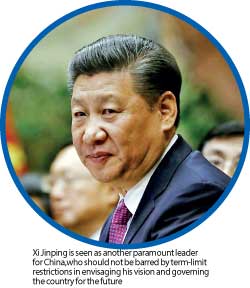Reply To:
Name - Reply Comment
Last Updated : 2024-05-11 03:39:00
 China adopted a new constitutional amendment removing the two-term restriction on President Xi Jinping enabling him to continue serving the country. The move has evoked widespread response from across the globe, both positive and negative depending on the prism through which it is viewed.
China adopted a new constitutional amendment removing the two-term restriction on President Xi Jinping enabling him to continue serving the country. The move has evoked widespread response from across the globe, both positive and negative depending on the prism through which it is viewed.
Those, who look at the move through the western perspective of democracy, see China as sliding towards authoritarianism or dictatorship with the latest step.
Be that as it may, at a recent plenary meeting of the 13th National People’s Congress (NPC), 2,958 national legislators voted in favour of Constitutional changes, with two against and three abstentions.
The development of the governing system in China, all in all, is rooted in historic circumstances. If the term-limit removal is taken in isolation of the historic, social and cultural context of China, conclusions may turn out to be inaccurate.
As such, it is noteworthy here to bear in mind the circumstances that led to the birth of current form of one-party governance in the People’s Republic of China, a country that has enjoyed strong central control throughout its history, barring occasional disturbances. The Chinese models haven’t been generalized yet as such in the world today whereas the western models have been in most instances.
System is historically rooted
Albeit, the Chinese system has evolved under historic, cultural and social contexts different to those of the western and other parts of the world.
Therefore, it is now fashionable for those interested in Chinese affairs to study these historic circumstances for better understanding of China and what is up on its sleeves.
One characteristic of its history is that it has been governed by central rule in which power is derived from one single authority. The central authority is respected by people. They pay tribute to it. In fact, such a notion called ‘all under heaven’ developed by ancient Chinese philosophers - Confucius, Mencius and Laozi- has become a cornerstone in Chinese culture in this sphere.
It’s a notion referring to a unified world. It was developed well before the unification of China under Qin dynasty in 221 BC.
The Chinese culture and traditions have shaped the evolution of its system up to date. In fact, socialism, which originated from Russia, assumed Chinese characteristics and survives unchallenged. Socialism with Chinese characteristics is not only well-entrenched in China, but also makes way for the country to reach new heights of prosperity.In fact, it has now been developed as a new discipline to be offered to students interested in the matter.
CPC continues to rule
The success of the Community Party of China (CPC) holding its perennial grip on power can be attributed to the uniqueness of its system in which people tend to believe in central authority from which power is derived to be respected by others.
In modern China, its communist leader Mao Zedong unified the country through revolution, and remained the head of the country from 1949 to 1959 and as the chairman of the party until his death in 1976. He laid the foundation for the forward march of Chinaunder a clearly defined line.
Next, Deng Xiaoping, as the leader, reformed China economically and placed the country on a growth trajectory that propelled it to make giant strides in development.
In addition to these main leaders of China, the central stage is now occupied by current President Xi Jinping whose term limit removal is debated in the world media. In the countries which cherish multi-party systems, such removal is seen as synonymous with dictatorship or imperialism.
But, with regard to China, it cannot be compared at all to dictatorships prevailing elsewhere in the world. It is, in fact, a different model which ensures one party rule with checks and balances. Actually, the Chinese leaders harp on the idea of multi-party democracy.
According to officials of the CPC, in a multi-party democratic system, a party that polls 51 percent votes rules a country based upon principles envisaged by it, but excluding those of the parties representing the remaining 49 percent voters. In contrast, they say the one-party model of China accommodates views of all concerned.
In addition to these main leaders of China, the central stage is now occupied by current President Xi Jinping whose term limit removal is debated in the world media.
President Xi occupies centre-stage
Followed by Mao Zedong and Deng Xiaoping, President Xi Jinping occupies the central stage in China’s current resurgent in the world stage. The economic boom, engineered by market driven reforms by Xiaoping, was heightened to the next level with China expanding its international trade and investment politburo under the current President.
Chinese national legislators adopted a constitutional amendment recently removing the two-term presidential limit.
Alongside, the new amendment adopted the Xi Jinping thought on Socialism with Chinese characteristics for a New Era.
In that sense, Xi Jinping is seen as another paramount leader for China, who should not be barred by term-limit restrictions in envisaging his vision and governing the country for the future.
 For all purpose, the term-limit removal is another feature or an adjustment of the Chinese system that keeps evolving. China is a civilization which is more than 5000 years old. Its cultural and social systems have keep it intact up to this date.
For all purpose, the term-limit removal is another feature or an adjustment of the Chinese system that keeps evolving. China is a civilization which is more than 5000 years old. Its cultural and social systems have keep it intact up to this date.
Foremost among all, the Chinese are traditionally used to and respect the central authority upheld from time immemorial. The Communist Party of China or one party system is phenomenon with this tradition at its core.
The term-limit removal is a decision taken by the CPC after internal deliberations, and as such the move is unlikely to meet with resistance internally despite some voice in the western media that the move would trigger a backlash.
The Chinese Constitution was adopted in 1982. It was amended in 1988, 1993, 1999 and 2004.
The latest amendment was proposed by the CPC Central Committee. The National People’s Congress’s Standing Committee adopted in in January and submitted to the first session of 13th NPC for deliberation on March 5. The amendment, brought in the form a piece of legislation, provides for enshrining the Xi Jinping Thought on Socialism with Chinese Characteristics for a New Era as a constitutional authority.
It is widelyseen as a beacon light that charts the course of China for the future. Already, China’s ambitious Belt and Road Initiative is underway under the leadership of President Xi.
It has made way for the global expansion of Chinese economic with increased ties with the countries across the globe. Even Sri Lanka joined hands with the project.
It is important to reflect a bit on the Chinese electoral system which is much different to the models practiced in the countries like ours. Basically, there are congressed in China, not elections in our sense as such.
Altogether, there are five central and local levels of people’s congresses in China. They are the National People’s Congress, the people’s congresses of provinces, autonomous regions and municipalities directly under the Central Government.
The people’s congresses of cities divided into districts, but the autonomous prefectures, the people’s congresses of cities are not divided into districts, municipal districts, counties and autonomous counties. The people’s congresses at all levels are constituted through democratic elections.
All citizens of the People’s Republic of China who have reached the age of 18 have the right to vote and stand for election, regardless of ethnic background, race, sex, occupation, family background, religious belief, education level, property status or length of residence. People who have been deprived of their political rights according to law do not have the right to vote and stand for election. One voter has only one vote in each election.
Deputies to the people’s congresses of cities not divided into districts, municipal districts, counties, autonomous counties, townships, ethnic minority townships and towns are elected directly by their constituencies. Deputies to the NPC and the people’s congresses of the provinces, autonomous regions, municipalities directly under the Central Government, cities divided into districts, and autonomous prefectures are elected by the people’s congresses at the next lower level.
All political parties and mass organizations may either jointly or separately recommend candidates to be deputies. Candidates may also be recommended by a minimum of 10 voters in a direct election and 10 deputies in an indirect election.
In both direct and indirect elections, the number of candidates must exceed the number of delegates to be elected and the elections must be competitive. In a direct election, the number of candidates should exceed the number to be elected by one-third to 100%. In an indirect election, the number of candidates should exceed the number to be elected by 20% to 50%.
Voters may vote for a candidate, vote against a candidate, vote for someone else, or abstain. In a direct election, more than half of the eligible voters in the election district must vote in order for the election to be valid, and candidates who receive the votes of a majority of the voters are elected. In an indirect election, candidates receiving the votes of a majority of the deputies voting are elected. The state treasury bears the costs for elections.
Chinese models getting to the world stage
Today, China has reached the superpower status. It is bound to overtake the United States as the largest economy of the world in the future. Alongside, it is well possible that Chinese models will also be globalized along with.
In some of the western universities, tailor-made courses are offered to accommodate Chinese students.
The Chinese language is taught as part of school curricular in some of these countries. In Italy, there is a move to recruit Chinese speaking police officers to help Chinese tourists. All are indications of Chinese systems getting to the world stage more and more with its rise as a super power.
According to Shen Chunyao, chairman of the Legislative Affairs Commission, the latest amendment was made in a legal and rational manner.
He said it had “wide and solid” political, legal and social basis.

Add comment
Comments will be edited (grammar, spelling and slang) and authorized at the discretion of Daily Mirror online. The website also has the right not to publish selected comments.
Reply To:
Name - Reply Comment
US authorities are currently reviewing the manifest of every cargo aboard MV
On March 26, a couple arriving from Thailand was arrested with 88 live animal
According to villagers from Naula-Moragolla out of 105 families 80 can afford
Is the situation in Sri Lanka so grim that locals harbour hope that they coul